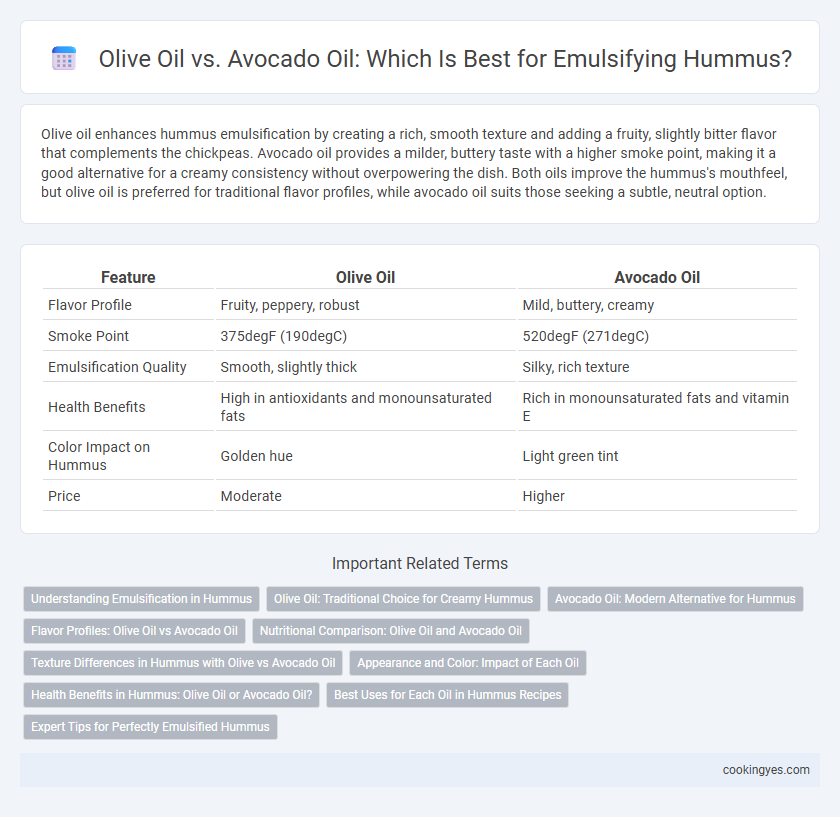Olive oil enhances hummus emulsification by creating a rich, smooth texture and adding a fruity, slightly bitter flavor that complements the chickpeas. Avocado oil provides a milder, buttery taste with a higher smoke point, making it a good alternative for a creamy consistency without overpowering the dish. Both oils improve the hummus's mouthfeel, but olive oil is preferred for traditional flavor profiles, while avocado oil suits those seeking a subtle, neutral option.
Table of Comparison
| Feature | Olive Oil | Avocado Oil |
|---|---|---|
| Flavor Profile | Fruity, peppery, robust | Mild, buttery, creamy |
| Smoke Point | 375degF (190degC) | 520degF (271degC) |
| Emulsification Quality | Smooth, slightly thick | Silky, rich texture |
| Health Benefits | High in antioxidants and monounsaturated fats | Rich in monounsaturated fats and vitamin E |
| Color Impact on Hummus | Golden hue | Light green tint |
| Price | Moderate | Higher |
Understanding Emulsification in Hummus
Olive oil and avocado oil both play crucial roles in the emulsification process of hummus, where fat integrates with water to create a smooth, creamy texture. Olive oil contributes a rich, peppery flavor and promotes a stable emulsion due to its balance of monounsaturated fats and antioxidants. Avocado oil offers a milder taste and higher monounsaturated fat content, enhancing the creaminess while helping to maintain the emulsion's consistency and nutritional profile.
Olive Oil: Traditional Choice for Creamy Hummus
Olive oil remains the traditional choice for creamy hummus emulsification due to its rich, fruity flavor and smooth texture that enhances the chickpea blend. Its high content of monounsaturated fats and antioxidants contributes to a silky consistency while providing health benefits. Using extra virgin olive oil preserves the authentic Mediterranean taste and achieves an optimal balance between creaminess and flavor depth in hummus.
Avocado Oil: Modern Alternative for Hummus
Avocado oil, rich in monounsaturated fats and vitamins E and K, offers a creamy texture and mild flavor that enhances hummus emulsification without overpowering traditional chickpea and tahini flavors. Its high smoke point and smooth consistency support stable emulsions, resulting in a silky, well-blended hummus that maintains freshness longer than olive oil. This modern alternative provides a nutrient-dense option, appealing to health-conscious consumers seeking innovative hummus recipes.
Flavor Profiles: Olive Oil vs Avocado Oil
Olive oil imparts a rich, fruity, and slightly peppery flavor that enhances the traditional Mediterranean taste of hummus, creating a vibrant and authentic profile. Avocado oil offers a mild, buttery, and subtly nutty flavor that allows the chickpeas and tahini to shine without overpowering the blend. Choosing between olive oil and avocado oil influences the final hummus's flavor depth and complexity, catering to either a more robust or a smoother palate experience.
Nutritional Comparison: Olive Oil and Avocado Oil
Olive oil is rich in monounsaturated fats, particularly oleic acid, which supports heart health and provides antioxidants like vitamin E and polyphenols that contribute to inflammation reduction. Avocado oil also contains high levels of monounsaturated fats and is a significant source of lutein, an antioxidant beneficial for eye health, along with vitamin E and potassium. Both oils enhance hummus emulsification by creating a smooth texture, but olive oil offers stronger antioxidant properties, while avocado oil provides additional nutrients like lutein and potassium for a nutritional boost.
Texture Differences in Hummus with Olive vs Avocado Oil
Choosing olive oil for hummus emulsification results in a smoother, silkier texture with a rich, slightly peppery mouthfeel that enhances the traditional taste. Avocado oil, in contrast, produces a creamier and thicker consistency, offering a subtle buttery flavor while maintaining a lighter, less oily finish. The monounsaturated fats in both oils contribute to emulsification stability, but the distinct fat profiles impact the final texture and richness of the hummus.
Appearance and Color: Impact of Each Oil
Olive oil imparts a rich golden hue to hummus, enhancing its traditional look with a glossy, vibrant finish, while avocado oil offers a lighter, pale-green tint that creates a fresher, creamier appearance. The darker pigments in extra virgin olive oil contribute to a deeper, more intense coloration, whereas the milder color of avocado oil preserves a brighter, more neutral tone. Choosing between these oils affects not only emulsification but also the visual appeal, with olive oil intensifying warmth and avocado oil promoting a subtle, healthful aesthetic.
Health Benefits in Hummus: Olive Oil or Avocado Oil?
Olive oil enhances hummus with high levels of monounsaturated fats and antioxidants like polyphenols, supporting heart health and reducing inflammation. Avocado oil offers a similar fatty acid profile but contains higher vitamin E content, promoting skin health and providing a mild, buttery flavor. Both oils improve emulsification by creating a smooth, creamy texture while delivering distinctive health benefits.
Best Uses for Each Oil in Hummus Recipes
Olive oil enhances hummus with a robust, fruity flavor and smooth texture, making it ideal for traditional recipes and as a finishing drizzle to enrich taste and appearance. Avocado oil offers a mild, buttery profile and high smoke point, perfect for creamy hummus variations requiring subtle freshness without overpowering chickpea flavors. Both oils contribute healthy fats and emulsification benefits, but olive oil suits classic Mediterranean tastes while avocado oil excels in modern, nuanced hummus recipes.
Expert Tips for Perfectly Emulsified Hummus
Olive oil's robust flavor and natural antioxidants enhance hummus emulsification by stabilizing the mixture and providing a silky texture, making it a favored choice among culinary experts. Avocado oil offers a smoother, milder taste with high monounsaturated fat content, which aids in achieving a creamy consistency without overpowering the chickpea base. Expert tips recommend slowly incorporating oil while blending at high speed to create a stable emulsion, regardless of oil choice, ensuring perfectly creamy hummus.
Olive Oil vs Avocado Oil for Hummus Emulsification Infographic

 cookingyes.com
cookingyes.com